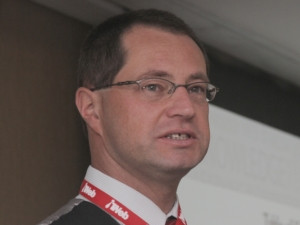
Vodacom is dipping its toe into Ethiopia, opening an office as it takes a calculated risk in the last mobile greenfields opportunity in Africa.
Vodacom has been keeping an eye out for other African opportunities as it seeks to expand its portfolio beyond SA, Lesotho, Mozambique, the Democratic Republic of Congo and Tanzania, where it recently upped its stake.
Now it, along with other hopeful operators, is making a move on Ethiopia, where telecoms solutions are still provided by a state monopoly, and penetration is at a relatively low 23%. The group, SA's largest operator, has opened an office in Ethiopia and is vying for a licence to provide value-added services.
Analysts view Vodacom's move as a calculated, but necessary, risk if it wants to grow its stake in Africa to boost its top line.
State control
Vodacom International COO Romeo Kumalo told Reuters the telco would apply for a licence to provide value-added services - all services other than voice - in the East African country. "But, more importantly, we want to position ourselves [for] when the market opens and the government does decide to grant licences in the consumer sector," he said.
"We would invest here tomorrow. Ethiopia is probably the most fantastic telecoms market on the continent. One operator, 80 million people, the economy growing at 7%; it's a great market."
Vodacom's move follows on the heels of rival MTN, which earlier this year secured a value-added service licence, but has yet to set up shop in the country. Vodacom was not able to provide more information on its plans this morning.
According to GSMA Intelligence, Ethiopia's state monopoly cellular company had 21.1 million connections out of a 92.9 million population at the end of 2012, the latest available figures. By far the majority - 99% - are prepaid. Only 13% of the country is covered by 3G, and SIM penetration is at 23%, says the association.

However, Addis Ababa has ruled out liberalising the sector, with the state instead spending its $321 million earnings from providing communications on vital infrastructure projects, reports Reuters.
Ethiopia's telecommunications sector is controlled by the state, which offers both fixed and mobile communications. It is currently run by Ethio Telecom, which replaced the Ethiopian Telecommunications Corporation in 2010, after the state outsourced management of the telco to France Telecom for two years.
Telecoms in the East African country dates back to 1894, when the then king introduced telephone technology, notes the Institute of Developing Economies, a Japanese external trade organisation.
Vital play
Africa Analysis analyst Dokeb Pater says Ethiopia offers a large addressable market with a big population and low penetration. He notes, however, disposable income is low, as is average revenue per user.
Voice makes up the largest portion of the market, and Vodacom may make a play for the data sector, says Pater. He explains this is likely to be in the enterprise market as consumers will offer low income-generating potential.
Pater says Vodacom is taking a calculated risk in a bid to establish itself for when a licence becomes available, which may take a few years. Vodacom "cannot afford to not be there".
Ovum analyst Richard Hurst says Ethiopia is the clear exception to the lack of greenfields opportunities on the continent. He notes Vodacom needs to get its ducks in a row now and sort out its African strategy.
Vodacom, which recently spent R2.5 billion to increase its Tanzanian stake, wants to boost income from its international operations to 25% of total revenue, within the next two years, up from the current 22%. Although it has been eyeing the African market for some time, it has yet to expand geographically.
Finding a new territory in which to expand will be difficult as the market is dominated by a handful of operators, with little up for grabs, Hurst points out. He says Vodacom's last attempt to expand its current boundaries was when it discarded a Zambian licence several years ago.
Pater notes Vodacom's last mobile expansion was when it moved into Mozambique a decade ago, although its business arm has been operationally strengthening its position on the continent.
Hurst says Ethiopia could turn into a "wealthy" business for Vodacom, although there is no indication of licences becoming available. "It's on the never-never." He adds Vodacom could gain first-mover advantage by opening an office as many operators are keen on the country.
Share